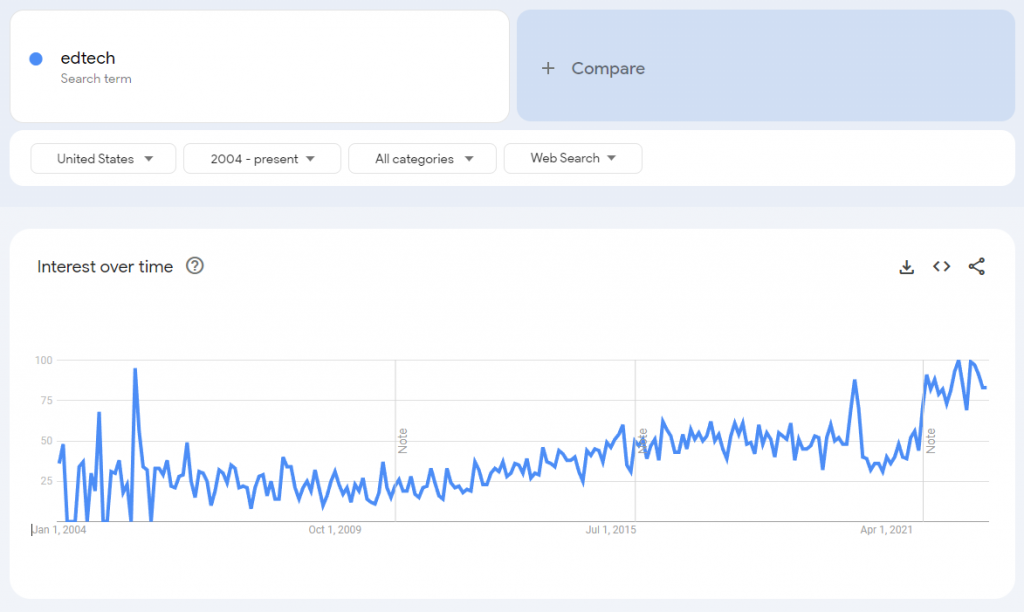Google Trends provides access to a largely unfiltered sample of actual search requests made to Google. It’s anonymized (no one is personally identified), categorized (determining the topic for a search query) and aggregated (grouped together). This allows us to display interest in a particular topic from around the globe or down to city-level geography. (Google, 2023)
Google Trends shows the trend of a search term over time. Data is collected from everywhere Google is used and can be viewed based on region. Related search terms are also suggested. Apart from seeing what’s currently trending in a region, you can also compare how smaller regions within a country are reacting to the trend. Current trends in developed nations may be used as a predictor for developing nations if it’s assumed that there will be a lag.
Google Trends FAQ: https://support.google.com/trends/answer/4365533?hl=en&ref_topic=6248052&sjid=14141918700606568903-AP
Google Trends search for “edtech” in the US: https://trends.google.com/trends/explore?date=all&geo=US&q=edtech

I think that this could be an under-utilized tool in the educators toolbox. While we talk about the need to follow the interests of our students, the reality is that many of us have a biased view of what our students are interested in. For example, it is easy to assume that hockey is a popular sport in many schools, yet we may just be hearing from a very vocal group. Other sports could be just as popular in web searches, and this google tool, depending on the geographic resolution, could provide significant insight into our students. After all, “selling” the ideas that we are teaching helps to create buy-in.
On the “venture” side of things, this could help in market research for new proposals by highlighting places were demand is high, or saturation is low.
Hi Mike, thanks for raising awareness about Google Trends and its functions. While reading about it, I couldn’t help but notice the dilemma between user data privacy and the need to detect and filter irregular activity. It’s a tricky situation—protecting privacy VS preventing potential criminal acts like telecom fraud.
I wonder if Google has taken proactive measures to monitor user activities effectively? It seems that although Google has made efforts, there might be room for improvement in addressing telecom fraud and other malicious online activities. Striking the right balance is undoubtedly a challenging task, but it’s essential for ensuring user privacy and maintaining a secure online environment.
I think this tool is extremely underutilized in primary research and should be shared by more educators in schools and universities. I studied Internet linguistics in my previous program and I gathered data from research articles that tracked verbiage and word usage across geography and time. I think that recreating that kind of research and inquiry on a smaller, more accessible scale, would be possible in a classroom activity or project. This resource can be used to teach students about language and media, and how to identify connections between linguistic trends and socio-political topics.
Google Trends represent another method of stats gathering and building knowledge bases which are incoporated into AI and Chat GPT Algorithms for ongoing improvement
and expansion of fact finding.- it is as others have mentioned a key component for stats and .base construction